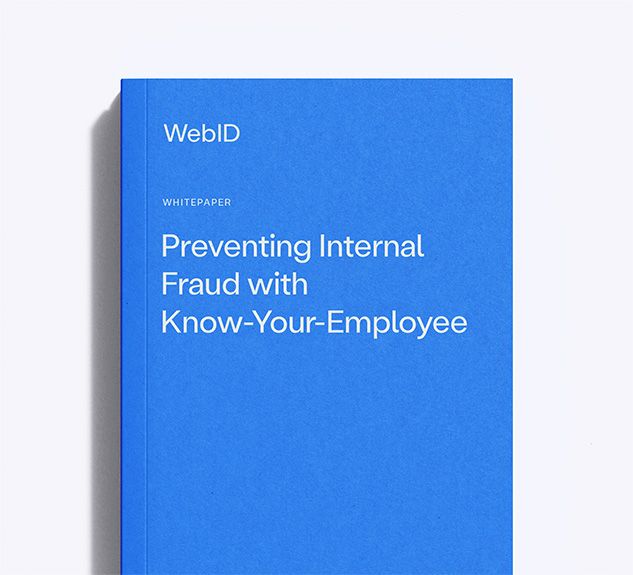Know Your Employee (KYE)
What Companies Need to Know About Employee Identity Verification
Cases of fraud committed by employees within companies have risen sharply in recent years. “Shill” schemes, inspired by fraudulent tactics used in crypto trading to inflate demands, are on the rise: In these schemes, false identity information is provided during recruitment processes, sometimes with the involvement of others to confirm the fraudulent details. In the best-case scenario, a company hires an unqualified person; in the worst case, criminals gain access to the company, installing malware, stealing confidential information, selling sensitive data, or engaging in other fraudulent activities.
To prevent such scenarios, Know Your Employee (KYE) procedures, which enable companies to verify the identity of their employees, are becoming increasingly important.
What is Know Your Employee (KYE)?
Know Your Employee (KYE) is a process used by companies to verify and validate the identity and background of their employees. This process helps companies prevent money laundering, terrorist financing, and other criminal activities while ensuring the integrity of their workforce.
To comply with KYE requirements, companies must conduct thorough screenings, particularly for employees tasked with money laundering or fraud prevention, or those holding high-risk positions within an organization.
Employee Background Checks
Employee background checks typically include criminal record verification as well as validation of qualifications and references. The specific documents required in a KYE screening depend on the industry and job level of the respective employees.
Core Aspects of the KYE Principle
- Reliability Check
The German Securities Trading Act (WpHG) requires reliability verification for employees engaged in investment advisory services, sales, or compliance functions. According to Section 6 of the WpHG Employee Notification Regulation, an employee is deemed unreliable if they have been convicted of crimes such as fraud, theft, money laundering, or other offenses within the last five years before taking up employment. - Thorough Selection
Employees in areas such as fraud prevention or high-risk positions must undergo rigorous background checks. Financial institutions and other regulated entities under the German Money Laundering Act (GwG) are required to assess their employees comprehensively to ensure compliance with KYE principles.
Which Companies Need KYE and Why?
KYE procedures help businesses across all industries strengthen trust, security, and compliance while protecting themselves from financial and legal risks.
- Companies Subject to Regulatory Requirements
KYE processes are mandatory for businesses operating in regulated sectors, such as banks, insurance companies, fintech firms, gambling operators, and real estate agencies. These companies must comply with strict regulations to ensure their employees do not pose financial or legal risks. - Companies Handling Sensitive Data
IT and technology companies use KYE procedures to safeguard sensitive data and confidential information. - Companies with Complex Supply Chains
Large corporations with intricate supply chains also benefit from KYE processes to identify and mitigate risks within their workforce at an early stage.
Difference Between KYE and Know Your Customer (KYC)
Know Your Employee (KYE) and Know Your Customer (KYC) are both essential components of compliance and risk management processes, ensuring adherence to legal and regulatory requirements. The key difference is their focus:
- KYC is aimed at verifying customer identities to prevent financial crimes such as money laundering, terrorism financing, and fraud. It ensures compliance with Anti-Money Laundering (AML) laws and other relevant regulations.
- KYE, on the other hand, focuses on verifying the identities of job applicants and current employees, ensuring their integrity and minimizing the risk of identity fraud and internal misconduct.
Compliance in Human Resources Management
HR compliance involves adhering to laws, regulations, and ethical standards within a company’s human resources department. It covers aspects such as employment law, data protection, and industry-specific regulations, while also promoting equal opportunities and non-discrimination.
KYE-related HR compliance measures include thorough employee screenings, particularly for high-risk roles, requiring recent criminal background checks during hiring, and verifying educational credentials, references, and other relevant qualifications.
Additionally, HR compliance involves proper documentation, storage, and regular updates of employee records.
GDPR-Compliant Employee Screening
Data protection plays a crucial role in employee screenings. Companies must handle and store applicants’ and employees’ personal data in compliance with the General Data Protection Regulation (GDPR). This includes collecting only necessary information and ensuring secure storage.
Identity Verification in Recruiting
During the recruitment process, verifying candidates’ identities and qualifications is essential. Automated tools help detect fraudulent resumes and certificates, enabling informed hiring decisions.
AMLD (Anti-Money Laundering Directive) for Employees
In regulated industries such as banking, financial services, and insurance, employees must be screened for potential links to money laundering, terrorist financing, or other financial crimes. A well-implemented KYE process is a crucial measure for meeting AMLD requirements.
Digital Employee Identity Verification
Digital identity verification is increasingly replacing traditional manual screening methods, especially in globally operating, decentralized companies. WebID, for example, offers various digital identity verification solutions that allow businesses to authenticate identity documents and credentials efficiently.
Preventing Internal Fraud with Know-Your-Employee (KYE)Preventing Internal Fraud with Know-Your-Employee (KYE)
This white paper explores some of the key challenges faced by HR professionals in the remote hiring process, navigates trough the evolution of KYC (Know-Your-Customer) and KYB (Know-Your-Business), culminating in the significance, benefits, challenges, and future implications of KYE preventing candidate and occupational fraud by utilizing online identification.
This white paper explores some of the key challenges faced by HR professionals in the remote hiring process, navigates trough the evolution of KYC (Know-Your-Customer) and KYB (Know-Your-Business), culminating in the significance, benefits, challenges, and future implications of KYE preventing candidate and occupational fraud by utilizing online identification.
